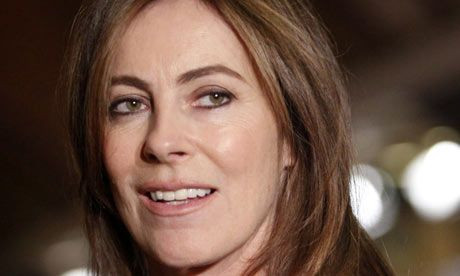Kathryn Bigelow Oscar Snub: Does The Academy Hate Female Directors?

This year’s Academy Award nominations seemed more about who didn’t get nominated than who did, but perhaps the biggest upset -- at least judging from reactions on Twitter -- was the snubbing of Kathryn Bigelow. The prolific filmmaker behind the how-we-killed-Osama drama “Zero Dark Thirty” was considered a shoe-in for a Best Director nomination on Thursday morning, when the nominations were announced by Emma Stone and Seth MacFarlane.
Bigelow, as many folks know, won a Best Director Oscar in 2010 for “The Hurt Locker.” She also happens to be the only woman ever to claim that honor. In fact, including Bigelow, only four women have ever been nominated for Best Director in Oscar’s 85-year history. That’s a dismal track record, even when we take into account the already dismally low percentage of women who actually get a shot at the director’s chair.
According to the 2012 Celluloid Ceiling Report, female directors comprised only 5 percent of directors working on the top 250 films last year, down from 7 percent the year before. Part of the problem, according to groups such as Women in Film, is the stubbornly persistent perception that all great directors are male. And year after year, the Academy has proven that it has no interest in helping to change that perception by nominating capable female directors.
Indeed, Oscar voters went a step further this year by willfully ignoring one of the most talked-about directors of the year, even as they thoroughly acknowledged the undeniable worthiness of her film. “Zero Dark Thirty” was nominated for Best Picture. Its lead actress, Jessica Chastain; its screenwriter, Mark Boal; and even its editors, Dylan Tichenor and William Goldenberg, also received nominations. Leaving Bigelow out of that mix was not just a snub. It was an act of defiance.
The question is why. There is, of course, the ongoing controversy surrounding the film's depiction of torture, as well as the rumor that it was made with the help of classified CIA. documents. Such taboos would certainly present an understandable reason for Academy voters to be skittish, as Salon’s Andrew O’Hehir pointed out on Thursday. But then why single out Bigelow for punishment?
That the Academy also snubbed “Argo” director Ben Affleck, a favorite who has long proven himself a worthy contender, may slightly mitigate the Bigelow omission, at least in the eyes of those who would like to believe that omitting Bigelow was not personal. Leaving Affleck in the cold helps make the case that either the Academy is simply out of touch or that it doesn’t like its directors getting cozy with the CIA.
Perhaps a more obvious answer, though, resides in the demographic makeup of the Academy’s 5,000-plus voting members, the identities of whom are kept mostly secret. A study by the Los Angeles Times last year found that the group is far more homogenous than the movie-going public it serves. Academy members, the Times found, are 94 percent Caucasian, are 77 percent male and have a median age of 62.
And yet, even if it turned out that the Academy is made up of aging, white misogynists, one would think Academy voters would want to present the image that they are not as out of touch as everyone thinks. What’s more, one would assume that they would jump at the chance to be more gender inclusive in the Best Director category, if for no other reason but to stave off well-founded complaints of blatant institutional sexism.
This year, they had the perfect opportunity to do just that. And they blew it.
© Copyright IBTimes 2024. All rights reserved.






















